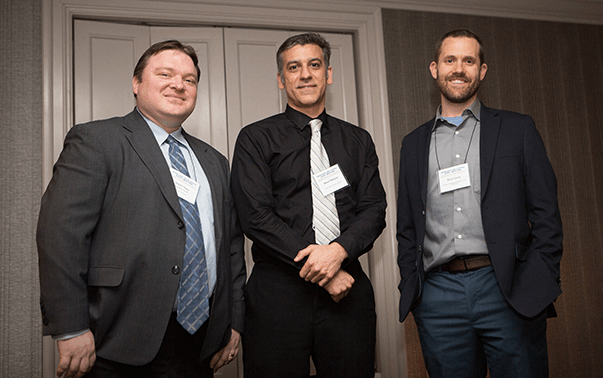The ASCI’s 2018 Young Physician-Scientist Awards
The ASCI is pleased to recognize the 35 recipients of its 2018 Young Physician-Scientist Awards. The Awardees presented their work at the ASCI’s Food & Science Evening, on April 21, 2018, as part of the AAP/ASCI/APSA Joint Meeting, April 20-22, 2018.
| Awardee | Institution | Abstract title |
|---|---|---|
| Ana Paula Abreu, MD, PhD | Brigham and Women’s Hospital, Harvard Medical School | MKRN3, a new player in the reproductive axis |
| Raag D. Airan, MD, PhD | Stanford University | Spatiotemporally precise and versatile noninvasive neuromodulation via focused ultrasonic drug uncaging |
| Francis J. Alenghat, MD, PhD | University of Chicago | Skap2 regulates atherosclerosis through macrophage polarization and efferocytosis |
| Vivek K. Arora, MD, PhD | Washington University School of Medicine | Bladder-cancer-associated mutations in RXRA activate peroxisome proliferator-activated receptors to drive urothelial proliferation |
| Megan T. Baldridge, MD, PhD | Washington University School of Medicine | Transferable microbiota factor stimulates resistance to norovirus infection in immunodeficient mice |
| Scott W. Canna, MD | University of Pittsburgh/Children’s Hospital of Pittsburgh | Dysregulation of interleukin-18 diagnostically distinguishes and pathogenically promotes macrophage activation syndrome |
| Brian Curran Capell, MD, PhD | Perelman School of Medicine, University of Pennsylvania | KMT2D regulates p63 target enhancers to coordinate epithelial homeostasis |
| Kevin J. Cheung, MD | Fred Hutchinson Cancer Research Center | Tumor cell clustering promotes breast cancer metastasis by increasing apoptosis resistance and cell proliferation |
| Silvia S. Chiang, MD | Alpert Medical School of Brown University/ Hasbro Children’s Hospital/ Center for International Health Research | Barriers to the diagnosis of childhood tuberculosis: a qualitative study |
| Janet Chou, MD | Boston Children’s Hospital | Leucine-rich repeat–containing 8A (LRRC8A) is essential for T cell activation by non-hematopoietic antigen-presenting cells |
| Louis Jared Cohen, MD, MS | Icahn School of Medicine at Mount Sinai | Bacterial modulation of human glycans in inflammatory bowel disease |
| Kimberley Jane Evason, MD, PhD | Huntsman Cancer Institute and University of Utah | Serotonin in zebrafish liver development and tumorigenesis |
| Jennifer E. Flythe, MD, MPH | University of North Carolina-Chapel Hill | Failed target weight achievement associates with short-term hospital encounters |
| Robert David Guzy, MD, PhD | University of Chicago | Fibroblast growth factor 2 decreases bleomycin-induced pulmonary fibrosis through inhibition of fibroblast collagen production |
| Andrew M. Intlekofer, MD, PhD | Memorial Sloan Kettering Cancer Center | Acquired clinical resistance to IDH inhibition through in trans IDH2 mutations |
| Prasanna Jagannathan, MD | Stanford University | Impact of dihydroartemisinin-piperaquine for intermittent preventive treatment of malaria during pregnancy on risk of malaria in early childhood |
| Benjamin Levi, MD | University of Michigan | Tuning inflammation to improve musculoskeletal wound healing through modification of monocyte/macrophage Tgfb1 |
| Piro Lito, MD, PhD | Memorial Sloan Kettering Cancer Center | Modeling the evolution of resistance to ERK signaling inhibitors at the single cell level |
| Steven E. Mansoor, MD, PhD | Knight Cardiovascular Institute, Oregon Health and Science University | Mechanisms of P2X receptor activation, desensitization, and antagonism |
| Jonathan J. Miner, MD, PhD | Washington University | Mouse models of Zika virus pathogenesis |
| Zaman Mirzadeh, MD, PhD | Barrow Neurological Institute | Perineuronal net formation in the hypothalamic arcuate nucleus-median eminence corresponds with the end of the critical period for AgRP/NPY neuron maturation |
| Chiadi Ericson Ndumele, MD, PhD | Johns Hopkins University | The association of longitudinal changes in metabolic syndrome with incident heart failure: the Atherosclerosis Risk in Communities (ARIC) study |
| Esther A. Obeng, MD, PhD | St. Jude Children’s Research Hospital | The nonsense-mediated decay pathway is a therapeutic vulnerability in myelodysplastic syndromes |
| Michael Joseph Ombrello, MD | National Institute of Arthritis and Musculoskeletal and Skin Diseases, NIH | IL1RN variation is associated with systemic juvenile idiopathic arthritis and predicts non-response to anakinra treatment |
| Cevher Ozcan, MD | University of Chicago | Mitochondrial mechanism of atrial fibrillation and novel therapies for primary prevention of the disease process |
| James R. Priest, MD | Stanford University School of Medicine | Rare inherited variants confer substantial risk for congenital heart disease in a large British cohort |
| Jarrad M. Scarlett, MD, PhD | University of Washington | Diabetes remission induced by the central action of fibroblast growth factor 1 |
| Chetan Shenoy, MBBS | University of Minnesota | Long-term outcomes after detection of left ventricular thrombus by late gadolinium enhancement cardiovascular magnetic resonance imaging |
| Neeraj K. Surana, MD, PhD | Boston Children’s Hospital | Moving beyond microbiome-wide associations to causal microbe identification |
| David B. Sykes, MD, PhD | Massachusetts General Hospital | DHODH inhibition as differentiation therapy for acute myeloid leukemia: understanding the metabolic therapeutic window |
| Viviany R. Taqueti, MD, MPH | Brigham and Women’s Hospital | Coronary microvascular dysfunction is a better discriminator of cardiovascular risk than body mass index in obese patients |
| Sarah Kathleen Tasian, MD | Children’s Hospital of Philadelphia and University of Pennsylvania | Essential JAK, SRC, and PI3K signaling pathways regulate cell survival in human Ph-like acute lymphoblastic leukemia |
| Kirk J. Wangensteen, MD, PhD | University of Pennsylvania Perelman School of Medicine | Novel combination therapy for hepatocellular carcinoma identified by genetic screening |
| Melissa Y. Yeung, MD | Harvard Medical School / Brigham and Women’s Hospital | Identifying key regulators of B cell–mediated transplant tolerance |
| Lilei Zhang, MD, PhD | Baylor College of Medicine | KLF15 regulates the circadian susceptibility to ischemia reperfusion injury in the heart |
Best Poster Award recipients
Each year, the ASCI recognizes three presenters with $1,000 Best Poster Awards. The 2018 Best Poster Award recipients are, from left, Drs. Guzy, Mansoor, and Canna.

